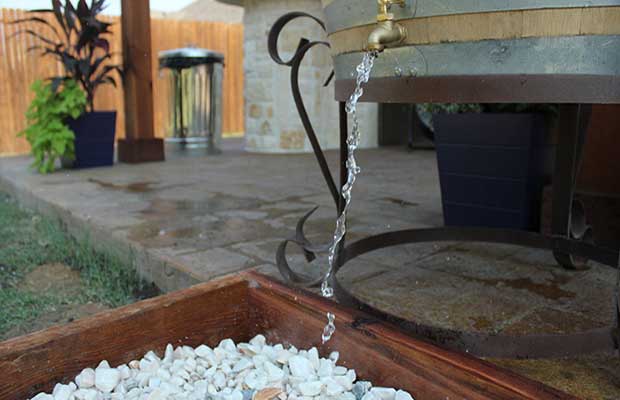Water is vital, especially in a survival situation is a critical resource you must be able to secure and filter.
The following are some suggestions as to how to set up a water collection and filtration system easily and at minimum expense.
For gardening, rainwater is, naturally, best unfiltered. But, for household use, the vintage book says the following instructions yield a cheap and easy way to make a filter just as good as a patent filter costing 10 times as much:
“Take a new vinegar barrel or an oak tub that has never been used, either a full cask or half size. Stand it on end raised on brick or stone from the ground. Insert a faucet near the bottom. Make a tight false bottom 3 or 4 inches from the bottom of the cask. Perforate this with small gimlet holes, and cover it with a piece of clean white canvas.
“Place on this false bottom a layer of clean pebbles 3 or 4 inches in thickness; next, a layer of clean washed sand and gravel; then coarsely granulated charcoal about the size of small peas. Charcoal made from hard maple is the best.
“After putting in a half bushel or so, pound it down firmly. Then put in more until the tub is filled within 1 foot of the top. Add a 3-inch layer of pebbles; and throw over the top a piece of canvas as a strainer. This canvas strainer can be removed and washed occasionally and the cask can be dumped out, pebbles cleansed and charcoal renewed every spring and fall, or once a year may be sufficient.
“This filter may be set in the cellar and used only for drinking water. Or it may be used in time of drought for filtering stagnant water, which would otherwise be unpalatable, for the use of stock.
“Or a small cheap filter may be made from a flower pot. A fine sponge may be inserted in the hole and the pot filled about as directed for the above filter. It may be placed in the top of a jar, which will receive the filtered water.”
Collecting your own rain water and then filtering it is one way to ensure you always have a supply of water, even if in a survival situation, you traditional sources of water are no longer available.
Remember, however, to check your local laws as in some places, believe it or not collecting rain water for human consumption is prohibited.
For more information on making your own rain water collection and filtration system, visit The Prepper Journal.
